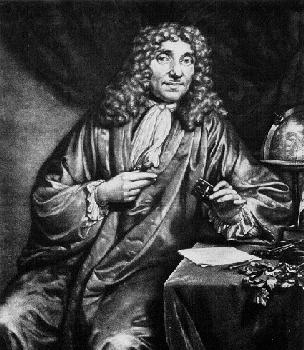
 Antony
van Leeuwenhoek (1632-1723) was a remarkable individual, a genuine Renaissance
Man, and a fine example of the sort of talented amateur who laid the foundations
of the life sciences. He was self-taught in many areas of science.
Antony
van Leeuwenhoek (1632-1723) was a remarkable individual, a genuine Renaissance
Man, and a fine example of the sort of talented amateur who laid the foundations
of the life sciences. He was self-taught in many areas of science.

He's usually described in biographies as "the Janitor from Delft" (his home town in Holland) but the term "Janitor" is misleading*, because the term doesn't mean what it does today. He was a curator, a caretaker, and the Man In Charge Of Everything at the Delft Town Hall. His profession was as a draper, i.e., he was in the textile trade, and he made a very good living at it. A prosperous merchant with many interests, he became fascinated by developments in optics and turned his mind to visualizing small things; even as Newton and others were developing better telescopes, he was inventing the microscope more or less single-handedly. He remained an active researcher into microscopic structure until well into his 80's. I took the occasion of a trip to Delft in 1997 to visit the site of his home. The building no longer exists, but a plaque marks the place where the science of microscopy began.
At right is one of Van Leeuwenhoek's original instruments. Although he is known to have made hundreds of them, nearly all have been lost. Only nine are known to have survived to the present day. The Leeuwenhoek microscope consists of two flat plates of brass (some were made of silver and gold) with a single lens mounted between them. The lens was a double convex type made of glass, ground to specific curvatures and polished. To use this instrument a specimen was impaled on the pin in front of the lens and its position adjusted by means of the screws to place it exactly at the focal point. Van Leeuwenhoek, of course, made his lenses by hand, using trial and error methods; as crude as this instrument may seem by today's standards, it was nevertheless good enough to effect a revolution in biology. His early reports, using instruments like these, include descriptions of the ciliated protozoa from pond water, red blood cells, and even bacteria from tooth scrapings. His descriptions of nerve structure are reasonably accurate even by today's standard.
*So is the term "amateur." Today this term implies a level of proficiency below the highest standard; but in fact the word derives from for Latin for "love." The real meaning of "amateur" is someone who does something for its own sake, not for money. An "amateur" can be (and often is) more skilled or competent at some endeavor than a "professional."